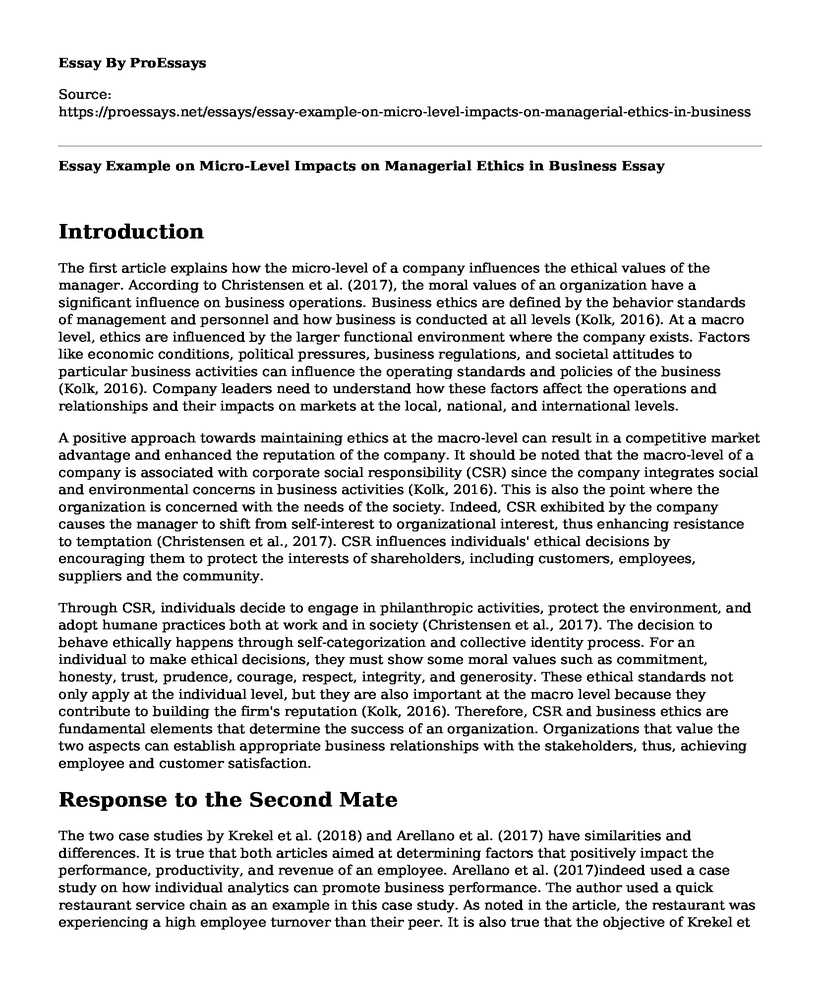Introduction
The first article explains how the micro-level of a company influences the ethical values of the manager. According to Christensen et al. (2017), the moral values of an organization have a significant influence on business operations. Business ethics are defined by the behavior standards of management and personnel and how business is conducted at all levels (Kolk, 2016). At a macro level, ethics are influenced by the larger functional environment where the company exists. Factors like economic conditions, political pressures, business regulations, and societal attitudes to particular business activities can influence the operating standards and policies of the business (Kolk, 2016). Company leaders need to understand how these factors affect the operations and relationships and their impacts on markets at the local, national, and international levels.
A positive approach towards maintaining ethics at the macro-level can result in a competitive market advantage and enhanced the reputation of the company. It should be noted that the macro-level of a company is associated with corporate social responsibility (CSR) since the company integrates social and environmental concerns in business activities (Kolk, 2016). This is also the point where the organization is concerned with the needs of the society. Indeed, CSR exhibited by the company causes the manager to shift from self-interest to organizational interest, thus enhancing resistance to temptation (Christensen et al., 2017). CSR influences individuals' ethical decisions by encouraging them to protect the interests of shareholders, including customers, employees, suppliers and the community.
Through CSR, individuals decide to engage in philanthropic activities, protect the environment, and adopt humane practices both at work and in society (Christensen et al., 2017). The decision to behave ethically happens through self-categorization and collective identity process. For an individual to make ethical decisions, they must show some moral values such as commitment, honesty, trust, prudence, courage, respect, integrity, and generosity. These ethical standards not only apply at the individual level, but they are also important at the macro level because they contribute to building the firm's reputation (Kolk, 2016). Therefore, CSR and business ethics are fundamental elements that determine the success of an organization. Organizations that value the two aspects can establish appropriate business relationships with the stakeholders, thus, achieving employee and customer satisfaction.
Response to the Second Mate
The two case studies by Krekel et al. (2018) and Arellano et al. (2017) have similarities and differences. It is true that both articles aimed at determining factors that positively impact the performance, productivity, and revenue of an employee. Arellano et al. (2017)indeed used a case study on how individual analytics can promote business performance. The author used a quick restaurant service chain as an example in this case study. As noted in the article, the restaurant was experiencing a high employee turnover than their peer. It is also true that the objective of Krekel et al., (2018) was to develop a causal relationship between the well-being and productivity of employees.
The article by Krekel et al., (2018) involved a large study that consists of an upward of 339 independent research studies, more than 1.8 million employees, and over 230 separate organizations. The study was conducted across 49 industries and 73 countries, as pointed out from the article (Krekel et al., 2018). It seems that both studies were looking for the correct integration of employee traits, work environment, and management styles as well as employee incentives that would optimize the performance, productivity, and revenue of the employee. Arellano et al. (2017) in their study found that personality traits, carer development opportunities, and the managerial style involving inspiring, empowering, recognizing, employee achievement, and developing strong teamwork are among the most significant attributes in a company.
The above factors increase productivity and revenue and promote employee retention. Based on the articles, Krekel et al. (2018) examined the impact of employee satisfaction and engagement on employee productivity, customer loyalty, and turnover rate. They found out measurable objective benefits to the well-being of employees as far as company performance, employee productivity, turnover rate, and customer loyalty are concerned. This article is simple to understand and is recommended for any person within the business industry. The fact that the articles examine the value of human capital to determine the impacts of job satisfaction, personality traits, and well-being of employees, on productivity, profitability and turnover rates, gives them credit. Undoubtedly, the studies from the two articles were well researched, and their variables tested. The studies also achieved their research purpose, which calls for their reliability.
References
Arellano, M., Blundell, R., & Bonhomme, S. (2017). Earnings and consumption dynamics: a nonlinear panel data framework. Econometrica, 85 (3), 693-734.
Christensen, L. J., Peirce, E., Hartman, L. P., Hoffman, W. M., & Carrier, J. (2017). Ethics, CSR, and sustainability education in the Financial Times top 50 global business schools: Baseline data and future research directions. Journal of Business Ethics, 73 (4), 347-368.
Kolk, A. (2016). The social responsibility of international business: From ethics and the environment to CSR and sustainable development. Journal of World Business, 51 (1), 23-34.
Krekel, C., Ward, G., & De Neve, J. E. (2019). Employee well-being, productivity, and firm performance: Evidence and case studies. Global Happiness and Well-Being Policy Report. Retrieved from ResearchGate.net
Cite this page
Essay Example on Micro-Level Impacts on Managerial Ethics in Business. (2023, Jul 18). Retrieved from https://proessays.net/essays/essay-example-on-micro-level-impacts-on-managerial-ethics-in-business
If you are the original author of this essay and no longer wish to have it published on the ProEssays website, please click below to request its removal:
- Collaboration Software Tools
- Forced Labour Essay Example
- Strategic Management: Case Analysis of McDonald's Paper Example
- Tool Creation, Visitation, and Analysis of an Organization Paper Example
- Leadership as One of the Critical Skills - Essay Sample
- Cognitive & Behaviorism Theory: Career Enhancement & Decision Making - Essay Sample
- Essay Example on Leadership: Striking a Balance of Inclusivity in the Workplace







